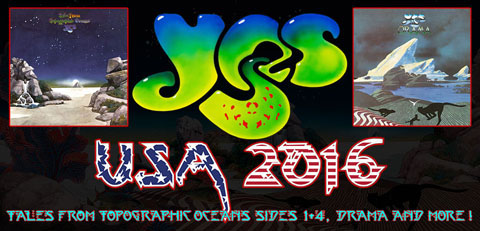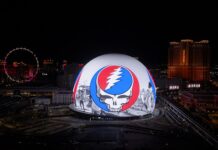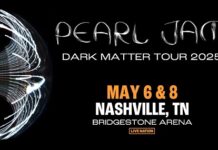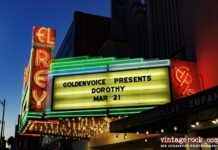Review by Shawn Perry
The fine line between bands with original members and bands without original members is becoming fuzzier and increasingly difficult to authenticate or castigate. These days, the very nature of a band is analogous to a sports team, with a virtual revolving door of members coming and going, redefining direction, highs and lows. The difference is bands are creative forces — not bought and sold franchises like sports teams— held up by personalities that form and shape the music, image and commercial value.
There are, of course, many bands with interchangeable identities (or no identities at all) that can get away with high turnover. Just ask the Grass Roots. But then you get to the Beatles, Led Zeppelin and Pink Floyd — bands so sacred, so identifiable by their founding members that the mere thought of replacing any single player is simply out of the question (except for those rare one-offs).
Yes sort of fits into the middle of all that. They’ve been changing members since their third album, when guitarist Steve Howe replaced Peter Banks. The album after that, Rick Wakeman moved into Tony Kaye’s keyboard seat. Alan White replaced Bill Bruford two albums after that, and so on. The point is that Yes may in fact be more of an “idea,” as Jon Anderson suggested to me in 2015, than a “band.” That “idea” will be on wide display when Anderson, Rick Wakeman and Trevor Rabin hit the road in the Fall of 2016. For now, the “idea” at the Orpheum was fulfilled by a different incarnation of Yes.

Actually, tonight’s presentation was a true test of just how effective Yes as an “idea” can be. As they have for the last two years, classic Yes albums are the main attraction at their shows. And here in the Orpheum, there definitely seemed to be more excitement about the albums — 1973’s Tales Of Topographic Oceans and 1980’s Drama — scheduled to comprise the bulk of the program than there was about who was going to be on stage playing them.
For the 2016, Steve Howe is the only legacy member, with Geoff Downes in a close second. Singer Jon Davison, in the driver’s seat for four years, has settled comfortably into the role. Or is a role? The similarities between Davison and Anderson are uncanny at some turns, yet you sense a concerted effort on Davison’s part to create his own identity. He certainly had no qualms singing the entirety of two very unique Yes albums, originally recorded with two different singers: Jon Anderson and Trevor Horn.
Billy Sherwood was equally impressive on bass, seemingly more in the groove of Chris Squire than you might expect, and piping in effectively on the high harmonies. Over on the drums, sitting in for an ailing Alan White, was Jay Schellen, who brought some much needed punch to the mix. A veteran with plenty of prog cred, Schellen was given the difficult task of playing some of White’s most intricate parts, and he pulled it off effortlessly, well within the parameters of what would invariably provide a challenge to most other drummers.
It began with Drama and “Machine Messiah” erupting, note perfect. This was Downes’ moment — Drama was the first album he made with Yes — so he and Howe were able to recreate their parts without much fuss. “Into The Lens” found Howe switching over to pedal steel, as he would from time to time, while “Tempus Fugit” gave Sherwood a chance to bring Squire’s epic bassline back to life. For everyone who gripes about Jon Anderson no longer being in the band, hearing Drama played from top to bottom is the one saving grace.

Before moving onto the next album, spot-on run-throughs of “I’ve Seen All Good People” and “Siberian Khatru” were trotted out before the break. Then, a lovely rendition of “And You And I” came and went before it was time for the first and fourth sides of Tale of Topographic Oceans. When it comes to the heavy lifting that often accompanies Yes music, this album is something that requires a little more concentration and patience. Rumor has it Rick Wakeman hated it so much, he left Yes (for the first time). Over the years, and possibly due to a recent 5.1 high-definition mix by Steven Wilson (scheduled, at press time, for an October 2016 release), Tales has gained more traction, more love perhaps, for being the wonderfully bloated, new-agey piece it is.
It might have been cool to see a little bit of Roger Dean’s art on the screen when they started in with “The Revealing Science Of God,” but that hardly negated from the smooth execution. Howe stepped up his volume swells, Downes channeled his best Rick Wakeman licks on the turnarounds, and the rest of the band followed along. When it came to “The Ritual (Nous Somnes du Soleil),” both Howe and Sherwood engaged, and Davison lead the choruses. Toward the end, Sherwood and Davison manned a few extra drums, and with Schellen, shell-shocked the audience with the song’s mind-bending percussive wail on the home-stretch.
All that was left for the night was an encore of “Roundabout,” this time pushing “Owner Of A Lonely Heart,” which no one on the stage actually played on, to the side. Yeah, you could say it was Steve Howe and Geoff Downes with a great band playing Yes music, but that would defy the whole “idea” of Yes — where the music takes precedence over its members. I can tell you there were few complaints as everyone exited the theatre into the cool, late summer night. The whole concept of Yes transcending the people in the band just might have some legs.





















